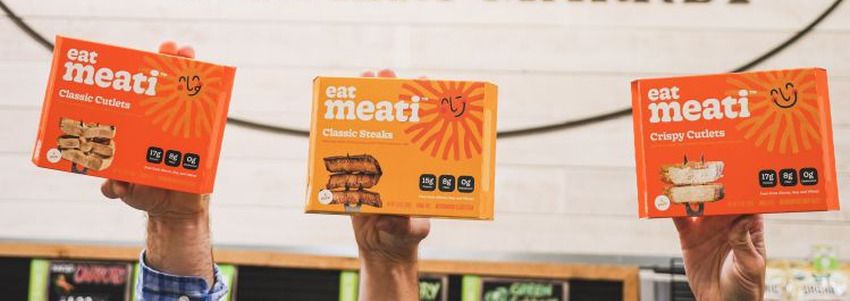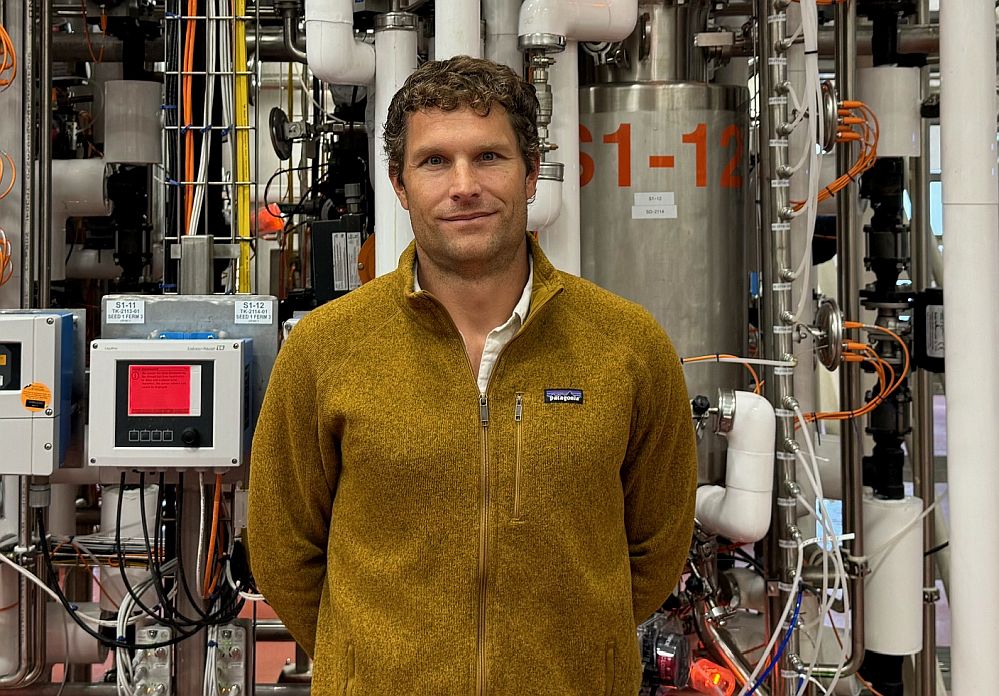“The product is fantastic,” says Phil Graves, who took the helm at fungi-fueled alt meat startup Meati Foods in February. “But it was clear when I joined that the business needed to make some strategic shifts and needed to make them quickly.”
Meati, which has raised $365 million to support its mycelium-based steaks and cutlets since it was founded in 2015, has engaged in four “painful” rounds of layoffs over the past couple of years.
But is also recruiting staff as it focuses on accelerating its path to profitability, says Graves, a former Patagonia executive who took the helm following the departure of CPG veteran Scott Tassani, who raised some eyebrows early last year after predicting Meati would generate $1 billion in retail sales in five years.
“We’ve put some overly exuberant goals out there publicly in the past and we own that, “Graves told AgFunderNews. “So today we are setting goals that are grounded in reality. What I am seeing in the market now is an increased sense of urgency. Can you show profitability not in 10 years, but in 12-18 months?
“And how we were set up when I arrived, the answer was no, so we needed to make some changes, as the market has dramatically shifted. We had raised a large amount of capital and brought in a lot of uncommonly talented individuals, but ultimately, we were overstaffed and we were very siloed. Instead of behaving like a scrappy startup, we were operating more like a big CPG.”
‘Instead of behaving like a scrappy startup, we were operating more like a big CPG’
Meati now has products in 7,000 locations across Kroger, Whole Foods Market, Meijer, Sprouts and Wegmans and others, and has experienced both “great wins and painful lessons,” said Graves.
“In the early days, we were myopically focused on door growth [adding new retail locations], but we took our eye off the ball in terms of retail execution. For example, if you go into 7,000 doors, you don’t necessarily see every authorized SKU [stock keeping unit] on shelf. Just because it’s authorized and supposed to be in your local Whole Foods doesn’t mean it’s necessarily there.
“What we’ve seen in bringing in John [new chief commercial officer John Bortells] and Dawn [new VP marketing Dawn Jacobs] is that we have to execute flawlessly. We need to hold our brokers accountable. We need to make sure that out of stocks are as low as possible.”
As for performance at retail, he said, “We have higher velocities at natural retailers, and going forward, we’re being more intentional about where we show up on the shelf, so we want to ensure that we know what products we’re sitting next to.”
“We’re not made from plants, we’re made from mycelium, with better nutrition and a cleaner, shorter, ingredient deck than the competition, so longer term we think we’ll be part of a [fungi-based] subcategory within alternative proteins that’s apart from plant-based. But in the meantime, we have to compete within this category.”

The evolving US meat alternatives category
Retailers, he claimed, are now “doubling down on the winners” in the alt meat category. “We’ve seen many companies raise a little bit of capital for a launch with a product that misses the mark, so we’re seeing a lot of those brands go away, but the overall shelf space isn’t shrinking. We are seeing a consolidation where the stronger brands with superior products are winning the shelf space.”
He did not share revenue growth numbers but claimed that Meati was bringing incremental growth to the category by attracting new shoppers, and achieving above average repeat rates. “One of our launch partners said that more than 40% of Meati purchasers were brand new to the category and repeat purchase rates were in the mid-50s.”

Sweating assets at the Mega Ranch in Thornton, CO
As part of the plan to accelerate the path to profitability, Graves is now talking to potential partners about utilizing spare fermentation capacity at its Mega Ranch in Thornton, Colorado to sweat assets until it is in a position to utilize all available space for in-house mycelium production, he said.
“We have 12 fermentation trains producing well over a million pounds per month, and the mid- and long-term plan is to use every bit of the Mega Ranch to produce mycelium for Meati Foods. We’re getting far more production per fermentation train than we had expected, and we have identified a handful of fermentation trains that are available for others to use.”
Ideally, he said, partners “would be like-minded companies building a sustainable product, so we are having conversations there, but there’s nothing concrete or imminent to announce yet. At the same time, we’re also talking with co-manufacturing partners for Meati products, because in time we are going to outgrow the Mega Ranch and the mid- and long-term plan is to have someone else produce [Meati whole cuts] on our behalf.”
He did not share details of what kinds of companies might utilize the Meati assets, but said the kit could be used for “a variety of applications for many different industries. We’ve talked with a handful of like-minded startups with strong interest in the fermentation side and they have a downstream footprint that would fit under the same roof. But we wouldn’t be working with companies that would be direct competitors with whole-cut mycelium products, for example.”
Beyond Meat’s move into mycelium: ‘It’s affirming’
Asked whether Meati would work with Beyond Meat, which has just revealed plans to move into mycelium-based whole cuts, he said: “It’s highly unlikely! We were talking about their news at today’s executive team meeting. In a way, it’s affirming. They raised a lot of capital and built a brand, but they’ve also had some hard feedback about their plant-based products, and it’s interesting they are now looking at mycoprotein.”
He added: “Our vision is to build a category and be a leader, so we welcome competition, although we also have a multiyear head start with the taste, texture, and product profile.”
Ultimately, he added, “The more pounds we get flowing through the Mega Ranch, the broader the base of the fixed cost. Ideally next year, we want to be first in terms of alternative protein companies that are consistently achieving positive gross margins and ultimately EBITDA margins, but a little bit too soon to pick a specific month as a goal.”

Marketing mycoprotein
Meati, which was recently hit with a putative class action lawsuit taking issue with its use of the term ‘mushroom root’ to describe its wares, is now embracing the term mycelium, said Graves. “We’ve actually been eating it for years with products such as tempeh and blue cheese [which use fungi strains as part of the production process].
“There’s plenty of products that either leverage mycelium in their manufacturing or have it as part of the end product. But people are also learning about the importance of mycelium, that it’s the foundation of ecosystems. John [new CCO John Bortells] says it best, that it’s the perfect food, and it’s been under our feet the whole time. We feel really good about our taste, nutritional profile, and the value of our products compared to existing alternatives.”
Stepping back, he said, “We do not intend to replace animal agriculture. I was CEO of a grass-fed red meat company, which I still hold dear in my heart. We want mycoprotein companies to flourish along with regenerative organic animal and plant-based companies so we can ultimately replace some of the companies who are making products that are atrocities from an animal welfare standpoint.
“We want every CAFO [concentrated animal feeding operation] to be gone, but there’s plenty of room for other players.”
According to Circana data crunched by 210 Analytics, US retail sales of meat alternatives fell 10.7% to $1.1 billion in the 52 weeks ending June 30, 2024 (total US, MULO, integrated fresh). Volume sales fell 13.3%.
For context, fresh meat department dollar sales were up 2.3% over the same period with volumes up 0.7%, while frozen processed meat sales were up 3.9% with units up 8.1%.





